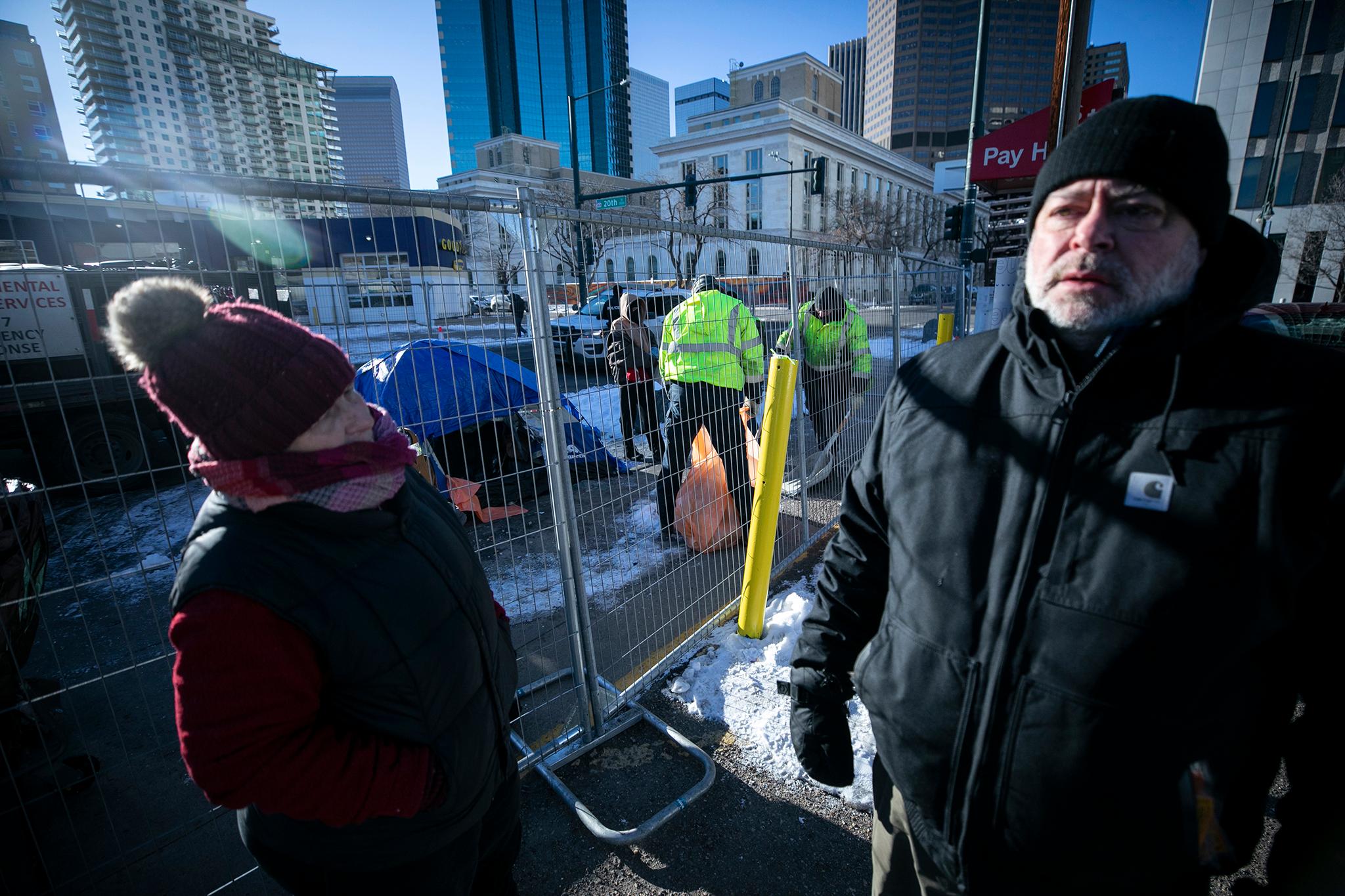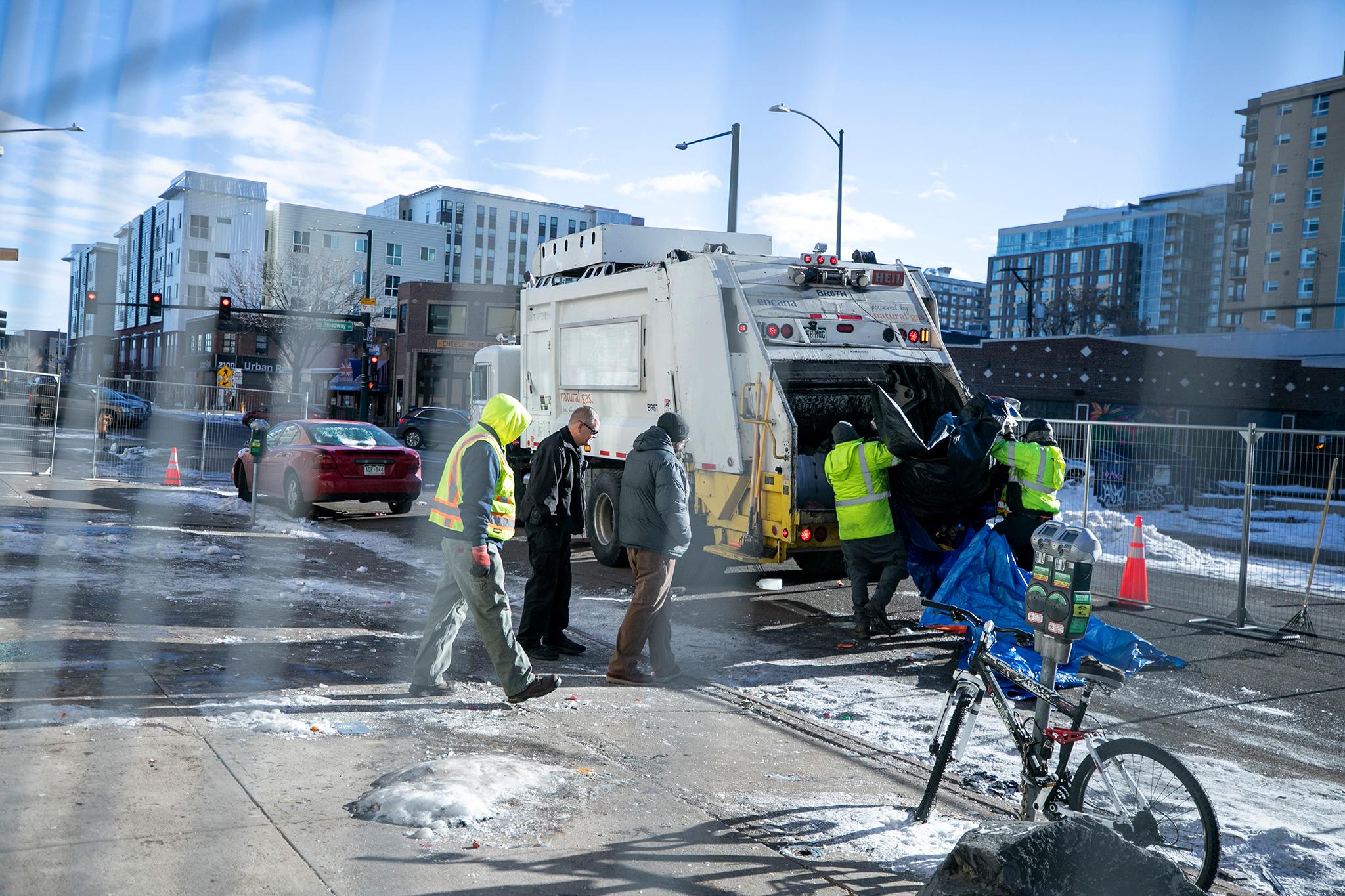The city of Denver is not making belongings taken during homeless encampment sweeps accessible enough to recover or sufficiently tracking related spending, data and policies, according to a report presented Thursday by the Auditor's Office.
The report found that, between January 2019 and June 2022, the city has spent almost $14 million on sweeps, though the auditor's office notes the costs of sweeping encampments are likely higher.
"The city lacks sufficient procedures and reliable data to ensure people experiencing homelessness who live in unauthorized encampments are treated equitably and lawfully," wrote the Auditor's Office in its report.
Many argue encampment sweeps themselves are inequitable and should be unlawful; the urban camping ban Mayor Michael Hancock signed into law in 2012 has continued to be a controversial policy in his administration and as the city decides who will replace him.
Some want to repeal the ban completely, pointing to studies that sweeps 'decrease life expectancy' and arguing that sweeps make it harder for people to move into longer term housing. Proponents often point to public safety concerns and encampments' effects on local businesses.
The Auditor's Office outlined in its report the ways Denver is falling short in its encampment response, along with a list of recommendations city officials have agreed to.
"Chronic unsheltered homelessness is the most complex issue any city will manage, and we appreciate the audit team, over the course of many months, taking a hard look at how our city is approaching the challenge of encampments," Hancock said in a statement Thursday.
A large portion of the report found issues with the way the city handles the belongings of people experiencing homelessness following sweeps.
Confiscating and throwing out belongings have long been a major issue among people experiencing homelessness and advocates, especially when people lose important paperwork or crucial items needed to survive on the streets. The report found that between Jan. 2019 and June 2022, only 8.7% of property stored from sweeps was picked up.
The audit analyzed to what extent the city is following the terms of the Lyall settlement agreement, a class action lawsuit dating back to 2019 that required Denver to give seven days' written notice before a sweep, 48-hour notice on unattended items and storage resources for belongings taken during sweeps. Since the settlement, civil rights lawyers have accused the city of violating its terms.
The report found that officials threw out belongings in storage before the 60-day limit in 21 cases between Jan. 2019 and June 2022. But the report also found deeper barriers to people experiencing homelessness picking up stored belongings gathered during sweeps, including situations where staff did not track property they had moved or discarded.
In one case, a miscommunication between different departments led to one person being unable to retrieve property before the 60-day deadline, after which the property was thrown out.

Communication and information about stored property from sweeps has also been an issue. For a few months during 2022, the city listed the wrong address for the property storage site, and one website lacked a phone number for people to call. The audit also expressed concerns about storage facility hours and a lack of transportation as barriers to people picking up property. Currently the facility is open for two and a half hours, four days a week, and facilities can be between two to 13 miles away from encampment sites, according to the report.
"We also found the city's communications to let people experiencing homelessness know about the property storage facility's location and hours of operation -- as well as how to retrieve their property -- is provided only in written English," wrote the Auditor's office in the report. "Therefore, it is not easily accessible to people whose primary language is not English or who may have a disability, such as a visual impairment."
The Auditor's office also found that the city lacks clear procedures, reliable data, expense tracking and sufficient staffing to respond to encampments.
"Members of the community on every side of this issue have been asking for tracked expenses for a long time now," Auditor Timothy O'Brien said in a Thursday statement on the report. "Although defining encampment response expenses is complicated, it's unacceptable that agencies are still not working toward a clear plan to address this."
The report found that the 10 city agencies that work on encampment response had spent $13.65 million responding to encampments between Jan. 2019 and June 2022. But the audit cautioned that the real figure is likely higher because it doesn't account for Denver Police Department expenses and because only four agencies provided expenses from the entire time period of the audit.
"Despite creating the Department of Housing Stability after our last audit, the city's multi-agency response remains lacking in formal structure and fundamental guideposts like a clear budget and expense tracking mechanism," O'Brien said.
The report also made a number of recommendations around establishing and documenting policies around a range of encampment data collection, including on property storage, staff training, encampment locations and outreach information.
Matthew Wilmes, head of Denver's encampment response, agreed to all the auditor's recommendations. But he cautioned that a lot could change with a new mayor.
Wilmes said the future mayor's priorities will especially play a role in the city's response to concerns raised about sufficient staffing and responding to staff burnout.
"As we look towards a new administration, there is the potential for the roles and responsibilities of all teams involved to change and that depends on the priorities that are set forth of the future administration," he said.
Evan Dreyer, Hancock's deputy chief of staff, said of the report Thursday that "We don't know what the future of this program will look like when the next administration takes office in 88 days and then gets up to speed and determines how, or if even it wants to continue with the program or make any changes to it."
It's a sense of uncertainty that hangs over much of city government right now, as Mike Johnston and Kelly Brough compete in the runoff for mayor.
Johnston said he would continue the sweeps due to health and safety risks and would also look to obtain 1,400 housing units through micro communities and hotels. Brough said she would end the sweeps but that she would also eliminate unsanctioned camping within her first year of office through the use of sanctioned camping sites and and Safe Outdoor Spaces.













